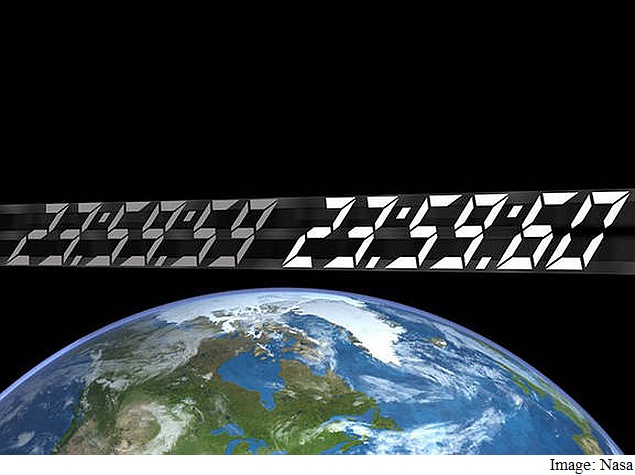Leap Second: A very old yet unique concept, discarding soon?


The world’s top metrology body has decided to end the practice of adding ‘leap seconds’ to official clocks to keep them in sync with Earth’s rotation from 2035. It was declared by all the scientists in General Conference on Weights and Measures (CGPM) in Paris to discard the ‘leap second’.
Yes, confusing as it sounds, leap second is something we are hearing this on internet a lot that ‘leap second’ is going to end. Let’s dig deep into the concept and understand it.
The time we follow all over the globe is decided by Coordinated Universal Time, or UTC, where a day lasts 86,400 seconds, i.e., a day is counted as 24 hours, 60 minutes and 60 seconds. A second is calculated by on the average of around 400 atomic clocks. These clocks are so accurate that they lose only about a second in 14,00,000 years.
But due to this time adjustment, the gradual slowdown of the Earth’s rotation and it is causing a trouble for numerous tech companies over the years.
Before we jump to the technicality of why it is being discarded, let us understand what and how leap second is decided!
The leap second was introduced in 1972 as a way to adjust Coordinated Universal Time (UTC) roughly every 21 months. The seconds are irregular due to varying speed of Earth’s rotation it is hard to predict the precise time and timekeeping.
What is UTC?
This 24-hour time standard is kept using highly precise atomic clocks combined with the Earth’s rotation. The Universal Time (UT) was created at the International Meridian Conference in 1884. This is the basis for the 24-hour time zone system we know today. The Greenwich Mean Time also known as (GMT) was chosen as world’s standard time, hence in India, the Indian Standard Time.
Greenwich Mean Time (GMT) was chosen as the world’s time standard. The reference line or starting point, the Prime Meridian, was determined to be the transit circle at the Royal Observatory in Greenwich, London. The transit circle is a part of the telescope’s mechanics and it is still cited as the prime meridian’s original reference (0° longitude). The time is decided through a longitude passing through India for Indian Standard Time.
What is atomic clock?
An atomic clock is a clock that measures time by monitoring the resonant frequency of atoms. It is based on atoms having different energy levels. Simply explained, every individual has different energy level, just like that every individual’s energy resonates differently, and if that is recorded, we get an average of all the energies.
Electron states in an atom are associated with different energy levels, and in transitions between such states they interact with a very specific frequency of electromagnetic radiation. This phenomenon serves as the basis for the International System of Units’ (SI) definition of a second.
Recent Posts
સાંસદોને પગાર વધારાની જરૂર લાગે છે!?
24 ટકાના વધારા પછી લોકોના મનમાં એક જ સવાલ,સાંસદો 5 વર્ષમાં કેવી રીતે કરોડો કમાતા…
આજે વિશ્વ વન દિવસ..જાણો કેમ મહત્વનો છે આજનો દિવસ
દર મીનીટે 36 ફુટબોલ મેદાન જેટલા કુદરતી વનોનો નાશ થઇ રહ્યો છે. ભારતમાં 33%ને બદલે…
વિશ્વ કવિતા દિવસ 2025: કવિતાનું મહત્વ અને સમાજમાં તેની ભૂમિકા
આજે વિશ્વ કવિતા દિવસ છે ત્યારે પ્રેમ હુંફ અને લાગણીઓ સાથે કલ્પનાની દુનિયા ઉમેરાય અને…
ગુજરાત પોલીસનું ઓપરેશન પતાલલોક: ગુંડાઓ સામે કડક કાર્યવાહી
પોલીસનું ઓપરેશન પતાલલોક! ડીજીપીના આદેશ છુટતા બિલમાં સંતાયેલાને બહાર લાવી કાયદાનો ડંડો વીંઝાશે!ગુંડારાજ વધતા પોલીસ…
મસાનમાં ‘ભસ્મ હોળી’ કેમ રમાય છે જાણો?
આ અનોખી પરંપરા અનાદિ કાળથી ચાલતી હોવાનો દાવો.મસાન હોળી વારાણસીના મણિકર્ણિકા ઘાટ પર મનાવવામાં આવી.…
હજુ પણ ગુજરાતમાં જીવે છે અંધશ્રદ્ધા!
અંધશ્રદ્ધાના અંત માટે સ્વૈચ્છિક સંગઠનો અને સરકાર દ્વારા અભિયાનો ચલાવવામાં આવી રહ્યા છે. છતાં સમાજમાંથી…

